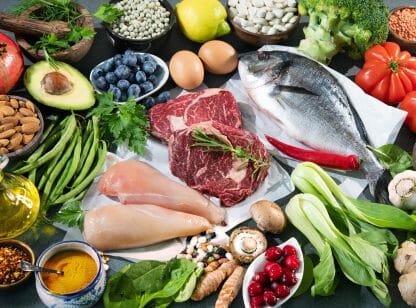The American diet is filled with calorie-rich and nutrient-poor foods. No wonder there is an epidemic of childhood obesity, ADD/ADHD, diabetes, heart disease and cancer. People are overweight yet nutritionally starving!
So what can we do about this crisis? The answer starts with your fork!
When talking about nutrition with my patients, I always tell them this: Food is medicine you put into your body 3 or more times a day. Think about it a different way: junk food is poison you put in your body 3 or more times a day. There is a simple truth behind the old adage, “you are what you eat.” Avoid the expensive processed foods filled with sugar, sodium, dyes, and a slew of other chemicals and preservatives. Be proactive in preventing future chronic disease!
Most people eat calorie-rich and nutrient poor foods. Within the past decade, pediatricians have seen a resurgence of rickets and scurvy (15th century diseases) due to the lack of vitamin D and vitamin C. Our children should not be suffering from diseases seen in pre-industrial revolution times. Currently, the top 10 most common nutritional deficiencies are: calcium, magnesium, vitamin D, folic acid, Iron, Vitamin B6, Vitamin B12, Vitamin C, essential fatty acids, and antioxidants.
The first step of living a healthy, vibrant life starts with eating healthy, nutrient-dense foods. Here are some examples of foods to eat to replenish your nutrients.
B vitamins (B12, B6, folic acid): Lean organic meats (bison, venison, grass- fed beef), organic poultry, wild caught fish (tuna, salmon, cod), beans, eggs, dark green leafy vegetables, and nuts and seeds.
Vitamin C: Papayas, bell peppers, strawberries, broccoli, pineapple, brussel sprouts
Calcium: Dairy, turnips, kale, Chinese cabbage, bok choy, broccoli
Magnesium: Seeds (pumpkin, sesame), almonds, spinach, Swiss chard, black beans
Essential fatty acids: Nuts and seeds (flax, walnuts), sardines, salmon, soybeans (whole)
Vitamin D: The Sun (I know it’s not a food, but it’s essential for life),
salmon, sardines, goat milk, cow milk
Iron: Green leafy veggies, legumes, beans, whole grains and, red meat
Eating healthy doesn’t have to be difficult or time consuming. Inexpensive, nutritious meals can simply be a baked chicken breast over mixed salad greens and vinaigrette, or stir-fried mixed vegetables and shrimp over brown rice. If you want to determine where you stand nutritionally, specialized blood tests can be ordered by your naturopathic doctor or holistic medical doctor.
You are the only person who can take control of your health. Let your fork pave the way to a vital, optimal life, one healthy bite at a time.
Dr. Sonja Fung is a primary care, naturopathic doctor at Live Well Clinic located on Washington and Hwy 111 in La Quinta at Point Happy Plaza. For more information you can visit www.livewellclinic.org or call at 760-771-5970.
Sources: 1) World’s Healthiest Foods. http://www.whfoods.com; 2) Gaby, Alan. Nutritional Medicine. Concord, NH: Fritz Perlberg Publishing, 2011.; 3) Office of Dietary Supplements- NIH. http://ods.od.nih.gov/factsheets/list-all; 4) West, August. Tackling the Most Common Nutritional Deficiencies: B Vitamins, Calcium & Other Minerals. Holistic Primary Care. Vol. 9, No. 2. Summer, 2008; 5) Oh, Robert. Brown, David. Vitamin B12 Deficiency. Am Fam Physician. 2003 Mar 1;67(5):979-986.














































Comments (0)